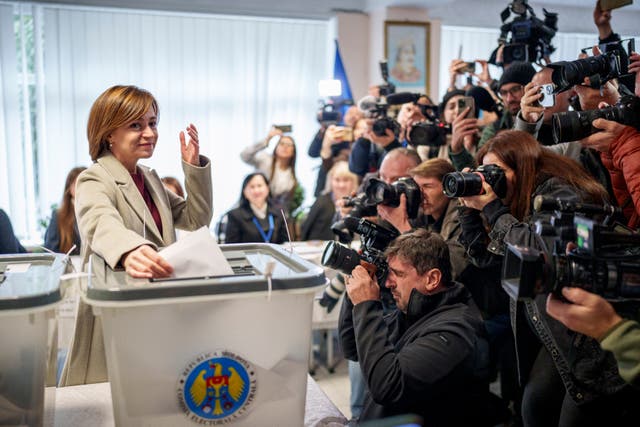‘Yes’ vote looks set to narrowly pass in Moldova, enshrining EU path
President Maia Sandu said criminal groups had been working to undermine the democratic process.

Moldovans in favour of securing the country’s path toward European Union membership have a razor-thin lead in a referendum vote, electoral data shows, as the pro-Western President accused “criminal groups” of trying to undermine the process.
After nearly 99% of votes were counted in Sunday’s referendum, which asked voters to choose whether to enshrine in the country’s constitution a path toward the EU, the “Yes” vote crept into first place with 50.18% of a total 1.4 million ballots cast, according to the Central Electoral Commission.
More than 200,000 ballots cast among the country’s large diaspora tended to favour the EU path and were being counted overnight.

President Maia Sandu said after about 90% of the votes were counted: “Criminal groups, working together with foreign forces hostile to our national interests, have attacked our country with tens of millions of euros, lies and propaganda, using the most disgraceful means to keep our citizens and our nation trapped in uncertainty and instability.
“We have clear evidence that these criminal groups aimed to buy 300,000 votes — a fraud of unprecedented scale.
“Their objective was to undermine a democratic process.”

The allegations include funding pro-Moscow opposition groups, spreading disinformation, meddling in local elections and backing a major vote-buying scheme.
In the presidential race that was held at the same time, Ms Sandu won the first round with 42% of the vote in a field of 11, but failed to win an outright majority.
She will face Alexandr Stoianoglo, a Russia-friendly former prosecutor general who outperformed polls with around 26% of the vote, in a run-off on November 3.
By the time polls closed at 9pm on Sunday, more than 1.5 million voters – about 51% of eligible voters – had cast ballots, according to the Central Electoral Commission.

“It’s going to be particularly problematic because … it’s going to feed into narratives that are pushed by the Kremlin and pro-Russian forces,” he said.
US national security spokesman John Kirby echoed Russian interference concerns this week, saying in a statement that “Russia is working actively to undermine Moldova’s election and its European integration”.
Moscow has repeatedly denied it is interfering in Moldova.
In early October, Moldovan law enforcement said it had uncovered a massive vote-buying scheme orchestrated by Ilan Shor, an exiled pro-Russia oligarch who currently resides in Russia, which paid 15 million euro (£12.4 million) to 130,000 individuals to undermine the two ballots.
Shor was convicted in absentia last year of fraud and money laundering and sentenced to 15 years in prison in the case of one billion dollars that went missing from Moldovan banks in 2014.
He denied the allegations, saying the payments were legal and citing a right to freedom of expression. Shor’s populist Russia-friendly Shor Party was declared unconstitutional last year and banned.





